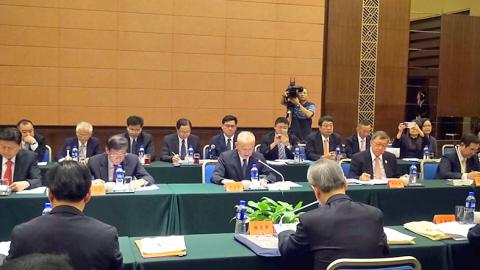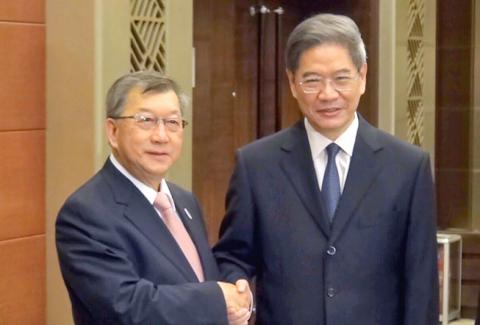Setting preconditions for cross-strait exchanges are not conducive to “meaningful dialogue,” Presidential Office spokesperson Alex Huang (黃重諺) said yesterday.
“Preconditions are not necessary for meaningful dialogue; only those [without preconditions] can facilitate genuine understanding between the two sides. Maintaining peace and stability across the Strait is the responsibility of both sides, and the Presidential Office believes that any initiative that improves mutual understanding is a worthy and positive effort,” Huang said.
Huang’s remark was in response to comments made yesterday by China’s Taiwan Affairs Office (TAO) Minister Zhang Zhijun (張志軍), who said that as long as the political foundation of the so-called “1992 consensus” remains solid, cross-strait exchanges can still be pushed forward.

Photo: CNA
The “1992 consensus” — a term former Mainland Affairs Council chairman Su Chi (蘇起) admitted to making up in 2000 — refers to a supposed understanding reached during cross-strait talks in 1992 that both Taiwan and China acknowledge that there is “one China,” with each side having its own interpretation of what “China” means.
President Tsai Ing-wen (蔡英文) and the Democratic Progressive Party (DPP) have never recognized the existence of such an agreement. China consequently cut off official channels of communication with Taiwan after Tsai was sworn in as president on May 20.
A Taiwanese delegation, comprised of Chinese Nationalist Party (KMT) and independent heads of local governments or their deputies, on Saturday arrived in Beijing and met with Zhang and Chinese People’s Political Consultative Conference chairman Yu Zhengsheng (俞正聲) ostensibly to discuss tourism and trade-related issues. The delegation, whose members include Hsinchu Commissioner Chiu Ching-chun (邱鏡淳), Miaoli Commissioner Hsu Yao-chang (徐耀昌), Hualien Commissioner Fu Kun-chi (傅崑萁), Lienchiang Commissioner Liu Tseng-ying (劉增應), New Taipei City Deputy Mayor Yeh Hui-ching (葉惠青), Taitung County Deputy Commissioner Chen Chin-hu (陳金虎) and Kinmen Deputy Commissioner Wu Cheng-tien (吳成典), called for both sides of the Strait to choose a “broad avenue” on which cross-strait economic, tourism, cultural and agricultural cooperation can be continued.

Photo: CNA
Zhang said the Taiwanese delegation is visiting China because local government heads are “disturbed” by the “severe impact” on cross-strait relations that arose from “changes in Taiwan’s political situation following May 20.”
The delegates “recognize the 1992 consensus and support peaceful development,” Zhang said, adding that the attendees have agreed “to insist on the 1992 consensus as a common political foundation, regardless of changes in the situation.”
“City-to-city exchanges are to continue under the precondition that the Taiwanese local governmental heads support the 1992 consensus,” he said.
National Taiwan University professor of political science Fan Shih-ping (范世平) said that by holding the meeting, Beijing runs the risk of tacitly admitting that Chinese tourists are a tool of united front political warfare, while calling into question the meeting’s ability to change the overall cross-strait conditions in any meaningful way.
“It seems that the TAO is doing busy work to fill quotas for the benefit of its higher-ups,” he said.
It is inappropriate for county commissioners and city mayors to visit Beijing at a time when they should be providing disaster relief to their constituents after the typhoons last week, DPP Legislator Cheng Yun-peng (鄭運鵬) said, adding that Beijing’s attempt to divide Taiwan’s local governments would lead to “backlash from residents of other counties and cities.”
A senior official involved in cross-strait affairs speaking on the condition of anonymity said that Beijing is believed to regard the delegation as little more than tool for “1992 consensus” propaganda and the delegates are unlikely to wring any concrete guarantees from China.
Additional reporting by CNA

US President Donald Trump yesterday announced sweeping "reciprocal tariffs" on US trading partners, including a 32 percent tax on goods from Taiwan that is set to take effect on Wednesday. At a Rose Garden event, Trump declared a 10 percent baseline tax on imports from all countries, with the White House saying it would take effect on Saturday. Countries with larger trade surpluses with the US would face higher duties beginning on Wednesday, including Taiwan (32 percent), China (34 percent), Japan (24 percent), South Korea (25 percent), Vietnam (46 percent) and Thailand (36 percent). Canada and Mexico, the two largest US trading

China's military today said it began joint army, navy and rocket force exercises around Taiwan to "serve as a stern warning and powerful deterrent against Taiwanese independence," calling President William Lai (賴清德) a "parasite." The exercises come after Lai called Beijing a "foreign hostile force" last month. More than 10 Chinese military ships approached close to Taiwan's 24 nautical mile (44.4km) contiguous zone this morning and Taiwan sent its own warships to respond, two senior Taiwanese officials said. Taiwan has not yet detected any live fire by the Chinese military so far, one of the officials said. The drills took place after US Secretary

CHIP EXCEPTION: An official said that an exception for Taiwanese semiconductors would have a limited effect, as most are packaged in third nations before being sold The Executive Yuan yesterday decried US President Donald Trump’s 32 percent tariff on Taiwanese goods announced hours earlier as “unfair,” saying it would lodge a representation with Washington. The Cabinet in a statement described the pledged US tariffs, expected to take effect on Wednesday next week, as “deeply unreasonable” and “highly regrettable.” Cabinet spokeswoman Michelle Lee (李慧芝) said that the government would “lodge a solemn representation” with the US Trade Representative and continue negotiating with Washington to “ensure the interests of our nation and industries.” Trump at a news conference in Washington on Wednesday announced a 10 percent baseline tariff on most goods

THUGGISH BEHAVIOR: Encouraging people to report independence supporters is another intimidation tactic that threatens cross-strait peace, the state department said China setting up an online system for reporting “Taiwanese independence” advocates is an “irresponsible and reprehensible” act, a US government spokesperson said on Friday. “China’s call for private individuals to report on alleged ‘persecution or suppression’ by supposed ‘Taiwan independence henchmen and accomplices’ is irresponsible and reprehensible,” an unnamed US Department of State spokesperson told the Central News Agency in an e-mail. The move is part of Beijing’s “intimidation campaign” against Taiwan and its supporters, and is “threatening free speech around the world, destabilizing the Indo-Pacific region, and deliberately eroding the cross-strait status quo,” the spokesperson said. The Chinese Communist Party’s “threats